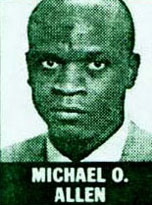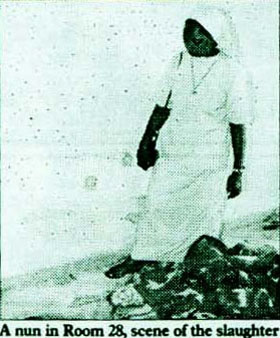 by MICHAEL O. ALLEN
by MICHAEL O. ALLEN
 Amidst lesser mountains, Kilimanjaro sat mysteriously in the distance, its brooding, mammoth expanse shrouded by clouds that streaked the rising sun. It was barely dawn at this wildlife reserve, and the elephants were headed out to the swamps.
Amidst lesser mountains, Kilimanjaro sat mysteriously in the distance, its brooding, mammoth expanse shrouded by clouds that streaked the rising sun. It was barely dawn at this wildlife reserve, and the elephants were headed out to the swamps.
I must confess that the burden I had carried in my heart to Amboselli National Park, in Kenya, lifted at the sight of that first baby elephant. It loped along goofily, trying to keep pace with its mother.
Twelve more gray pairs followed, then a herd of wildebeest and a span of gazelles, warthogs, and buffalo. Cattle egrets paced with hippopotamus, munching grasshoppers while scampering from underfoot.
This visit last month to the wildlife preserve was my attempt at a vacation. Yet I held little hope that it would banish the nightmares that had been creeping into my sleep or erase memories of the horrors I had witnessed as reporter covering the tragedy in Goma, Zaire, and Rwanda.
A dozen zebras heading to a pond for a drink looked warily at three Maasai warriors approaching in the distance. A pack of hyenas, accompanied by two jackals, ate a baby wildebeest under the gaze of a council of vultures peering from the trees.
Here on the plains under the shadow of Kilimanjaro, the laws of nature were apparent. Animals engage in their own Darwinism. But how to explain the unnatural carnage of the prior month—the gruesome slaughter of 500,000 Tutsis by the majority Hutus, and the mass deaths of refugee Hutus from politics and disease?
Humans, when we deign to acknowledge our place in the animal kingdom, think we are better, more evolved beings than the beasts cavorting on the plains. The scriptures assures us, after all, that we are created in the image of God.
When, with the world’s complicity, a Rwanda happens, it gives us pause. It gave me nightmares—nightmares that started at one site of the carnage, and which have plagued me until I arrived home, in New York, this week.
Inexplicably, the nightmares began shortly after I arrived with other reporters to stay at the CentreCQ Cristus, a Jesuit retreat in Kigali, Rwanda, a few weeks ago. I say “inexplicably” not to diminish the horror of what happened at Centre Cristus, but it’s not clear to me why the story of what happened there affected me more than the horrors I actually witnessed.
In the last four weeks I have seen human who beings die en masse bulldozed into mass graves. At one point, I refused an invitation by my driver-guide-translator in Kigali, Selemani Hakizimana, to go into a house where he said more than a thousand corpses were still rotting away.
But at the Centre Cristus, no sooner would I lie down to sleep than the eight priests, seven nuns, the cook and unidentified woman killed there just weeks before I arrived would trot out into my dreams, demanding I reckon with them.
Their murderers, pangas (weapons) in hand, also chase me in my dreams.
The Rev. Octave Ugirashebuja, the center’s director, who was away in Nairobi teaching the day of the murders, later told me that the killers spared one priest and one nun that they recognized to be Hutus.
“But it was a question of power,” Ugirashebuja said. “They used ethnicity because it was something that was simple for the people to understand.”
The killers herded the priests and nuns and the cook and the woman across a grassy walkway into a room I could see looking out the windows in my rooms. The white door to the room, with the number 28 written in red raised paint, was closed now but I pushed my way in.
I counted 33 bullet holes in the walls. Someone had put lime salt on the ground and on a mattress lying on the floor. But the blood, though dried now, was splattered everywhere, on the ceiling and walls and the floor. Next to the room, about 10 feet away, the earth rose in a mound of red clay on the spot where the killers hurriedly dumped all 17 bodies in a shallow grave.
You could blame the nightmares I was having on Larium, the malaria medication I’ve been taking. But my dreams have been so specific.
In one sequence that came to me in a London hotel room, the Kigali butchers shot me at the stake, descended on my cadaver with machetes, then burned the pile, producing an immaculate skeleton lying in my ashes.
When I left Kigali for Nairobi two weeks ago I told myself the assignment was over. The world must reckon with what happened here. But my work, for the moment, was done.
The nightmares have abated, somewhat. Still, I cannot forget. I see Room 28 today as clearly as if I’m still standing inside it.
One object in the room holds my attention now. It’s a framed painting of a duck swimming in a pond that hung on the wall with an inscription written in French:
“You must not forget the joy and beauty of the world.”
Michael O. Allen is a Daily News Reporter.

